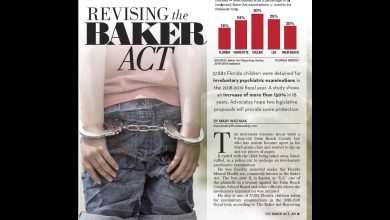
THE CONDITIONS OF BAKER ACT – HOW SOMEONE FALLS UNDER THIS ACT
The Baker Act Polk county Florida statute permits the patient to commit for up to 72 hours to a mental health treatment facility if the patient exhibits specific violent or suicidal symptoms. The Baker Act defuses a crisis and gives time for a mental health examination. After the holding period, the person may release if it decides they are not a risk to themselves or others and are not having a mental health crisis.
The Baker Act permits the temporary custody and evaluation. It refers to those who exhibit signs of mental illness and pose a threat to their safety or the safety of others. It covers the possibility of both physical damage and self-neglect. The Florida Mental Health Act of 1971 is its legal name. The statute is more popularly referred to as the Baker Act after former Florida state representative Maxine Baker, one of the bill’s co-sponsors. The purpose of the Baker Act was to protect the rights of persons forcibly committed. It superseded the old 1874-era state mental health statute that was infamously “draconian.”
The new law established strict requirements for using the Baker Act. For persons who are Baker Acted, among other things, representation is now necessary. The Baker Act, Foundations Wellness Center, and the word law written in scrabble letters on a wooden table. The Baker Act and the Marchman Act occasionally mix up. Involuntary examination and commitment are permissible under Florida’s Marchman Act but only to treat substance dependence.
What standards apply to the Baker Act?
- There is “reason to think” that a person has a mental disease, and as a result of the mental illness:
- Despite a “conscientious” explanation and disclosure of the aim of the test, the subject has declined to examine. Or the person’s mental disorder prevents them from realizing that an evaluation is necessary. AND
- In the absence of proper treatment, the person will likely cause actual physical damage to themselves.
- A lack of proper treatment will effect a “real and present” threat from a lack of self-care that the intervention or help of family members and friends or other available services cannot avoid.
What is it meant to be Baker Acted?
No matter which of the three approaches is employed, it all begins when a law enforcement officer picks up the subject. If a person still needs to be in a receiving institution, that is. For instance, if a hospital provides treatment for a receiving facility and a patient visits the emergency room (ER) for care, whether the condition is mental illness-related or not. If the attending physician finds that the patient fits the Baker Act’s requirements, the patient may be kept in the institution. The individual will bring to one of three locations if an officer picks them up:
-
Hospital Emergency Room
The officer may transport the person to a hospital emergency room if they find that they are having a medical emergency, as defined by the law. This hospital could or might not be a Baker Act-receiving institution. Unless the person’s attending physician certifies that they have an emergency medical condition, a receiving facility must examine them within 72 hours. The patient may see by a doctor or clinical psychologist in the hospital or a recognized receiving facility and either be discharged or transferred to voluntary status after twelve hours of verification that the patient no longer has a medical condition or that the state has stabilized. Or, the patient might send to a facility that can provide the necessary medical care. After stabilizing the situation, the patient must transfer to a Baker Act receiving facility within 12 hours.
-
To be processed by law enforcement
Even if the individual meets the Baker Act’s requirements for an involuntary examination, they must first be processed by law enforcement if detained for a felony.
-
To a receiving facility
The person will be sent immediately to the closest receiving facility, barring a criminal arrest or a medical emergency. The person who has been taken to a reception facility by a law enforcement officer must be accepted. The state of Florida currently has 134 receiving facilities. A medical professional or clinical psychologist will evaluate within 72 hours. Finding out if the person satisfies the requirements for release is the aim.
Expert’s examination for Baker Act
The expert doing the examination will:
- Review the transportation form, the document that started the inspection, and recent behavioral observations.
- Describe your short medical history.
- Obtain a face-to-face examination
Again, the three-day window is where all of this must take place. The outcome of the evaluation will determine the following steps.
What occurs following the Baker Act’s expiration?
The individual must be discharged within 72 hours, either for outpatient care or on their recognizance, unless:
- They either have a criminal accusation against them, OR they voluntarily offer their “express and informed permission” to be detained or admitted.
- A medical professional must attest that the patient is capable of making decisions regarding their mental health and medical problems that are “well-reasoned, deliberate, and knowing” OR
- The facility manager submits a petition to the circuit court for involuntary placement.
The Baker Act is funded by who?
Unfortunately, even if it wasn’t their idea, the patient is responsible for paying for the first 72-hour examination and any additional treatments. In addition, the patient is liable for all deductibles and co-pays, whether covered by private insurance, Medicaid, or Medicare.
Baker Act privileges
When someone is in Baker Act, their constitutional rights are not lost. Additionally, the law guarantees the following rights to those with mental illnesses:
-
Individual Dignity
All constitutional rights provide for those who are Baker Acted. It is required to treat patients humanely throughout treatment and transportation.
-
Treatment rights
Treatment for mental illness cannot be withheld or delayed based on financial circumstances. The patient must be involved in the treatment planning process. It must also be suitable for the person’s condition and as unrestrictive as feasible. Immediately after arriving, a physical checkup is mandatory.
-
Informed and Express Consent
The Baker Act encourages people to actively seek the mental health therapy. It may according to their choice. It is known as express and informed consent. Consent must be free, expressed in writing, followed by an adequate explanation, and given by a competent individual.
-
Treatment Quality
Services must exhibit in a skilled, safe, and compassionate manner. They must tailor to the client’s medical, rehabilitative, social, educational, or vocational requirements. The use of restraints, isolation, seclusion, physical management strategies, emergency treatment orders, and higher degrees of monitoring is subject to rules. The statute also specifies complaint resolution and grievance processes.
-
Right to Visit, Report Abuse, and Communicate Baker
Whether it’s a phone call, a letter, or a visit to the institution, acted persons can speak with outsiders confidently and without restriction. However, if communication is prohibitted, advance written notification must be given. There will never be any restrictions on calling the person’s lawyer or the Abuse Registry.
-
Care and custody of Personal Effects
As long as it’s not against safety or health regulations, people are free to keep their clothes and belongings. However, the witness must count every personal belonging, if taken.
-
Voting rights in Baker Act
In every public election in which they are eligible to vote. Acquitted people are still allowed to cast a ballot and register to vote.
-
Treatment and discharge planning
Individuals have a right to participate in both processes. Once released, they can also make plans and seek the professional’s help they choose.
-
Sexual Abuse Is Not Allowed in Baker act
Employees who engage in sexual activity with a patient while getting care at a facility are breaking the law. Anyone who fails to report such an occurrence commits a misdemeanor. Anyone who fails to report such an occurrence commits a misdemeanor.




